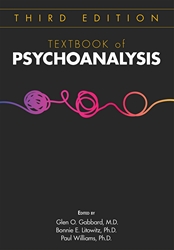Psychodynamic Therapy for Personality Pathology
Treating Self and Interpersonal Functioning
View Pricing
Description
Deftly combining contemporary theory with clinical practice, Psychodynamic Therapy for Personality Pathology: Treating Self and Interpersonal Functioning is an invaluable resource for any clinician seeking a coherent model of personality functioning and pathology, classification, assessment, and treatment. This insightful guide introduces Transference-Focused Psychotherapy—Extended (TFP-E), a specialized but accessible approach for any clinician interested in the skillful treatment of personality disorders.
Compatible with the DSM-5 Section III Alternative Model for Personality Disorders—and elaborating on that approach, this volume offers clinicians at all levels of experience an accessible framework to guide evaluation and treatment of personality disorders in a broad variety of clinical and research settings.
In this book, readers will find:
- A coherent model of personality functioning and disorders based in psychodynamic object relations theory
- A clinically near approach to the classification of personality disorders, coupled with a comprehensive approach to assessment
- An integrated treatment model based on general clinical principles that apply across the spectrum of personality disorders
- An understanding of specific modifications of technique that tailor intervention to the individual patient's personality pathology
- Descriptions of specific psychodynamic techniques that can be exported to shorter-term treatments and acute clinical settings
Patient assessment and basic psychodynamic techniques are described in up-to-date, jargon-free terms and richly supported by numerous clinical vignettes, as well as online videos demonstrating interventions. At the end of each chapter, readers will find a summary of key clinical concepts, making this book both a quick reference tool as well as a springboard for continued learning.
Clinicians looking for an innovative, trustworthy guide to understanding and treating personality pathology that combines contemporary theory with clinical practice need look no further than Psychodynamic Therapy for Personality Pathology: Treating Self and Interpersonal Functioning.
Contents
- Foreword
- Preface
- Video Guide
- Chapter 1. Introduction: A Model of Treatment Targeting Self and Interpersonal Functioning
- Section I: Personality and Personality Disorders Through the Lens of Object Relations Theory
- Chapter 2. Personality and Personality Disorders Within the Framework of Object Relations Theory
- Chapter 3. Clinical Psychodynamics Within the Framework of Object Relations Theory: Conflict, Anxiety, Defense, and Internal Object Relations
- Section II: Overview of TFP-E: Basic Tasks, the Therapeutic Relationship, and Strategies of Treatment
- Chapter 4. Basic Tasks and Elements of Treatment
- Chapter 5. The Therapeutic Relationship: The Therapist's Attitude and Stance, the Therapeutic Alliance, Transference, and Countertransference
- Chapter 6. Strategies of Treatment and Mechanisms of Change
- Section III: The Skillful Consultation
- Chapter 7. Patient Assessment and Treatment Planning
- Section IV: Establishing the Treatment Frame
- Chapter 8. Essential Treatment Contracting: Behaviors, Adjunctive Treatments, and Medication
- Section V: Techniques and Tactics of TFP-E
- Chapter 9. Identifying a Focus for Intervention
- Chapter 10. Intervening I: Exploratory Interventions and the Interpretive Process
- Chapter 11. Intervening II: Transference Analysis and Tactics Guiding the Interpretive Process
- Chapter 12. Intervening III: Integrating Supportive and Exploratory Interventions
- Section VI: Phases of Treatment and Trajectories of Change
- Chapter 13. Early, Middle, and Advanced Phases of Treatment
- Chapter 14. Afterword
- Appendix: Helpful Resources
- Index
About the Authors
Eve Caligor, M.D., is Clinical Professor of Psychiatry at Columbia University College of Physicians and Surgeons, and Director of the Psychotherapy Division and Training and Supervising Analyst at the Columbia University Center for Psychoanalytic Training and Research, New York, New York.
Otto F. Kernberg, M.D., is Director of the Personality Disorders Institute at Weill Cornell Medical College, Professor of Psychiatry at Weill Cornell Medical College, and Training and Supervising Analyst at the Columbia University Center for Psychoanalytic Training and Research, New York, New York.
John F. Clarkin, Ph.D., is Codirector of the Personality Disorders Institute at Weill Cornell Medical College and Clinical Professor of Psychology in Psychiatry at Weill Cornell Medical College, New York, New York.
Frank E. Yeomans, M.D., Ph.D., is Clinical Associate Professor of Psychiatry at Weill Cornell Medical College, and Director of Training at the Personality Disorders Institute at Weill Cornell Medical College. He is also Adjunct Associate Professor of Psychiatry at the Columbia University Center for Psychoanalytic Training and Research, New York, New York.
Related Products
Carousel Control - items will scroll by tabbing through them, otherwise arrows can be used to scroll one item at a time








